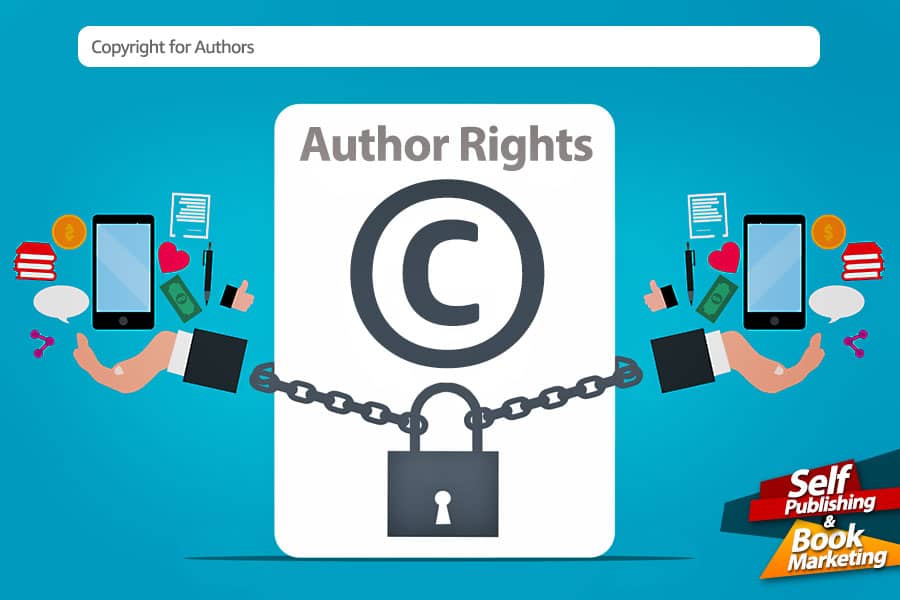
Sandra Wendel - March 22, 2022 - 
Author Rights. A Quick Guide to Get Copyright Right.
Copyright is one of the most common questions in my classes concerning author rights when I teach authors how to write a book. And their ideas about copyright are usually wrong. Here is how we set the record straight.
Read this disclaimer first: I am not a lawyer, but I do read legal thrillers, which does not make me an expert on anything. Please consult an attorney if you have legal questions about your book, author rights and copyright violations, but make sure you are talking with an attorney who specializes in intellectual property. The lawyer who handled your divorce is not the sharp legal mind to deal with copyright questions. I don’t know the legal details for copyright in countries other than the US.
Copyright is federal protection for work you create to protect your author rights. When you write your book, whether that’s on a computer or longhand on a legal pad, you are instantly protected because you created the book in a fixed format (on paper or in a computer file). It is no longer an idea in your head (you cannot copyright an idea).
Declare Your Author Rights
If you feel more comfortable putting the copyright symbol © on every page of your manuscript, fine. It’s not necessary. You are already protected by America’s copyright laws simply because you wrote your work in that fixed format. Your author rights are guaranteed.
When your book is published (not just written), and you have a final ebook or paperback, then you file Form TX with the Library of Congress in paper form or online. You send copies (or upload files) and pay about $45 (check online for current fees and procedures). You receive an official form back showing you have filed your copyright. Done.
Don’t file the form with early drafts of your work. It’s a waste of money and the time of the copyright employees at the Library of Congress. Only file with your final book (just one filing even if your book is in various formats such as audio or hardcover or paper or ebook). You are protecting your words.
Avoid Copyright Scams and Misconceptions
Sometimes authors fear emailing their full manuscript to agents or editors or early readers. They worry that someone will steal their work. No one will steal your work (the instances are rare). You also don’t have to have editors or agents sign a nondisclosure agreement (NDA). We work with manuscripts all the time. If you don’t trust that person, an NDA is still no protection.
Don’t mail yourself a copy of the manuscript and think the postal date is proof of when you created your work. This date stamp—often called a poor man’s copyright—is an incredible waste of paper and postage. The official acknowledgment of the filing of your copyright counts.
One author told me his golfing buddy was setting him up with an attorney who could handle copyright.
The author said, “He told me his buddy would charge about two thousand dollars to handle my copyright.” Seriously? Maybe those sick lawyer jokes have some truth to them.
I replied, “I am going to save you a couple grand.”
You do not need an attorney to file your copyright. You do not need to pay legal fees. And actually you don’t need to formally file for copyright protection at all (but that’s another discussion). You’re welcome. Send me $2,000.
Violation of copyright is a federal offense. If someone does violate your copyright, the matter is a federal case. It’s expensive to file and expensive to defend. Having the formal filing confirmation document helps your case. And there is some discussion now about being able to file in small claims court for violations. Stay tuned.
Let’s Take a Tour of a Copyright Page
Check any published book and you’ll see a page printed on the left-hand side after a title page with a wealth of essential fine print. If you don’t supply this information, your editor and publisher should prompt you for the following elements:
Most important is the year of copyright and the symbol © or word copyright. This line also includes the name of the copyright holder (that’s you, the author). If there are two authors, you need a separate agreement between you to determine who owns the copyright (both can).
The publication information includes the name of the publishing company and a contact email or website or both for the author. If you are published traditionally, your publisher will fill all this in. They are the publisher. If you are publishing independently, then your LLC or other corporate entity is the publisher.
You’ll also list the ISBN numbers for each version of the book: paperback, ebook, hard cover, audiobook. ISBNs are like VIN numbers for cars. You register your publishing entity at Bowker and buy ISBN numbers (the best deal is a bank of ten because you’ll use one for each version and save the rest for your next book). I understand that my Canadian author friends just apply for and receive ISBNs in Canada at no cost.
Do not be tempted by free or low-cost ISBNs offered by scammers online (then your book is identified in someone else’s name). Amazon’s KDP offers to assign ISBNs, and this option may be right for you. Most of the time it is not.
Do not confuse ISBNs with copyright. These are two separate processes. But you will need your ISBN number to fill in one of the blanks on the copyright form.
Traditional publishers will assign your book their ISBNs. You still retain your copyright to your work, no matter who publishes it. And your traditional publisher will normally file copyright for you. Be sure to ask, “Who is filing the copyright forms?”
Now about credits. And here is where copyright comes back into play, only you’re on the hook for protecting the copyright of others.
If you used long excerpts from other books in your book, and you received written permission, note that on the copyright page (Excerpt on page 49 used with permission from Chris Peterson, author of This Is His Book Title.). Short excerpts are usually covered by fair use, but no one has determined how long a quote under fair use might be.
If you reprinted song lyrics and received written permission (and probably paid a fee), note that on the copyright page too. Do not use song lyrics without permission—not even one line. Now we’re talking about copyright violation, and you will not get away with it.
If you used images such as graphics or photographs from various sources, you need written permission and a notation of that on the copyright page. Just because something appears on the internet, it’s not fair game. You have to track down the original owner. Same with poetry. Written permission is required.
If a photographer allows you to use their photos or if you’ve paid a fee for use, even if the photos are of you, ask them how they wish the credit line to read (example: Used with permission from Frank’s Fine Fotos.). Print the credit line in the photo caption and on the copyright page.
You see, here you are, trying to protect your own author rights and not realizing you might be violating someone else’s copyright. Just crediting someone or a source for information is not enough without written permission.
My legal eagle is Helen Sedwick, and her book, Self-Publisher’s Legal Handbook, is my go-to guide for all things copyright and permissions, author rights, fair use, song lyrics, poetry, and libel and slander.
File for Formal Copyright
I just filed my copyright forms online for my book with the Library of Congress, and I must say the screens are not easy to navigate. Read the instructions carefully or you’ll get frustrated trying to get through. You can even upload your book files (interior PDF and cover JPG) and not have to mail books at all. Again, read the instructions to see if you qualify. I paid with a credit card.
The good news is that you can do it yourself and should. The sort-of bad news is that the final screen tells you how long the processing takes. When I filed, the time lag was three to four months. But my copyright was protected the minute I finished writing my book on my computer. The form just confirms the legal status.
What’s your best protection? Write an amazing book. File for formal copyright as directed here. Don’t use information or images from someone else without written permission. Bask in the glow of having a published book. Don’t worry about copyright. You’ve got this.
If you liked this article you might also like:
• Amazon Author Central – How to Setup Your Author Page on Amazon!
• The Book Marketplace Has Changed. Make Your Book Available From All the Online Retailers!
• The Levels of Writing and Editing Explained Once and for All
• Why First-Time Authors Need an Editor!
• Book Marketers Secrets – 7 Secrets of Top Book Marketers!
• Self-Publishing Success Stories. Secrets of Million Dollar Self-Publishers!
• Never Judge a Book By Its Cover! – Are You Really Sure?
• Business Plan for Authors. Do Authors Need a Business Plan?
• Creative Book Marketing Ideas for Selling Your Books!


